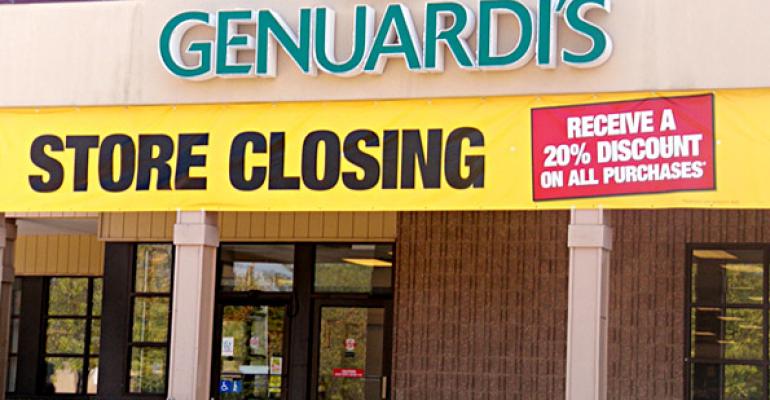CARLISLE, Pa. — Giant Food Stores here last week agreed to purchase 16 Genuardi’s stores from rival Safeway for $106 million, a move that will further grow Giant’s rapidly expanding share of the Philadelphia market and could spell the end of the 92-year-old Genuardi’s Family Markets banner.
(The home page photo appears courtesy of Pattye Benson of Community Matters.)
Safeway summarily said it intended to exit the Philadelphia market, closing three Genuardi’s stores not in the deal and looking to sell the remaining eight stores that Giant did not purchase.
SN in October had reported that Giant, a division of Amsterdam-based Ahold, was a likely buyer for the Genuardi’s stores in October.
“Giant is always looking for convenient locations to better serve our customers,” Rick Herring, president of Giant, said in a statement. “We are very excited to have the opportunity to expand our presence in greater Philadelphia and serve new customers.”
Giant has grown rapidly into the Philadelphia region in recent years, beginning with the purchase of 13 former Clemens Markets stores in 2006. The Genuardi’s stores it is buying represent some of that chain’s top locations north and west of the city. Giant in a separate deal in late 2010 purchased and later converted Genuardi’s stores in Feasterville and Warrington, Pa.
The addition of 16 Genuardi’s stores would grow Giant’s share in Philadelphia near that of longtime market leader Acme Markets, according to various estimates. Metro Market Studies’ 2011 Grocery Distribution and Analysis Guide showed Acme holding a market-leading 16.8% share, with Giant second at 12.3%. Genuardi’s, as a result of recent closures, has shrunk to around 3.4% market share, according to a recent estimate by Cantor Fitzgerald.
The stores Giant are purchasing are in the Pennsylvania towns of Chalfont, East Marlborough, Flourtown, Huntingdon Valley, Jamison, King of Prussia, Langhorne, Maple Glen, Newtown, North Wales, Roslyn, Spring House, Springfield, St. David’s, West Chester and Wynnewood. Safeway said it would close stores in Exton, Norristown and Royersford, Pa., leaving it eight stores it said it would continue to operate while looking for a buyer. This group includes locations in Doylestown, Norristown, Conshohocken and Audubon, Pa.; and four stores in New Jersey — two in the Philadelphia suburbs of Cherry Hill and Marlton, and two in the shore towns of Egg Harbor and Barnegat.
“We have made the decision to exit the greater Philadelphia market, including four stores in New Jersey, and focus our resources in those operating areas where we have a stronger presence,” Steve Neibergall, president of Safeway’s Eastern Division, said in a statement. “We will be working with the purchasers to ease the transition for our store employees and making efforts to facilitate continued employment for as many of them as possible.”
Genuardi’s has been “problematic” for Safeway ever since acquiring what then was a 39-store, $1 billion chain for $530 million cash in late 2000, analysts said. A wealth of conventional and discount competitors — including Giant, ShopRite, Target, Wal-Mart, Aldi and Bottom Dollar — have carved up the Philadelphia market since then, while shoppers resisted Safeway’s efforts to fit Genuardi’s into its corporate profile.
“The Genuardi’s acquisition did not fare well from the beginning as its merchandising [and] store operations were ‘Safeway-ized’ too much and too quickly, in our view,” John Heinbockel, an analyst for Guggenheim Securities, said in a research note last week. “As a result, the business never really gained momentum and its market share appeared stuck below 10% in a fragmented market.”
Heinbockel estimated Genuardi’s in total generates around $540 million in annual sales — almost half the business it did a decade ago. While remaining profitable, the stores were a drag on Safeway’s overall profitability, he said.
“It’s a smart strategic move for Safeway because it’s too expensive to get more size and scale in a market where ShopRite operators are having significant success at the same time that Target converted virtually all its stores to food, discount and drug,” Burt P. Flickinger III, managing director of Strategic Resource Group, New York, told SN. “At the same time you’ve had hard discounters coming very heavily, between Aldi and Save-A-Lot. It’s an oversaturated market with declining real income and increasing competition.”
Karen Short, an analyst for BMO Capital Markets, cautioned that some of the benefit from selling the Genuardi’s stores could be blunted by the effects of the volume loss on buying costs for Safeway stores in the Washington, D.C., market. Both Safeway and Ahold — whose Giant-Landover division competes with Safeway in Washington — buy from C&S Wholesale Grocers, Keene, N.H. “It’s possible the reduced volumes could trigger an increase in the costs to serve the remaining 131 [Safeway] stores in the division,” Short said.
Giant will likely bring a sharper price image and additional sales volume to locations that previously traded on Genuardi’s reputation for quality, observers said. That slightly upmarket image had eroded some since Safeway acquired Genuardi’s from descendants of its family founders, they conceded.
“Giant’s pricing profile everyday has become more competitive and is connecting more with consumers,” Flickinger said.



